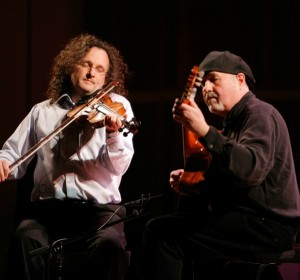There’s Irish music with trombones, Irish music with Bruce Springsteen lyrics, and then there’s Irish music played on traditional instruments and not all that different from what you might have heard by the fireside anywhere in County Clare a hundred years ago.
The old stuff is as pure as the wind rustling across the Burren, as raw as peat smoke. Fiddler Martin Hayes, himself from Maghera, East Clare, knows this territory all too well. He easily and lightly treads the well-worn path. He’s equally familiar with some of the more experimental applications of the tradition, to be sure. With his frequent collaborator guitarist Dennis Cahill, he formed the band Midnight Court in the 1980s, a melding of rock and jazz. But it’s the pure drop, as the old-style music is sometimes called, that Martin Hayes plans to celebrate as he, together with six talented colleagues, appear April 15 at the Annenberg Center in the “Masters of Tradition” concert.
If you’re going, you’ll hear some of the finest musicians Ireland has to offer. In addition to Hayes: David Power on uilleann pipes; singer Iarla Ó Lionáird; Cathal Hayden, fiddle; accordionist Máirtín O’Connor; and Seamie O’Dowd and Dennis Cahill on guitar.
The “Masters of Tradition” concept has its roots in a long-running annual festival of traditional Irish music in Bantry, County Cork, in conjunction with West Cork Music, a classical music organization. Hayes is the artistic director of the Masters program. In 2009, Hayes was invited to bring the “masters” to Australia for concerts in the iconic Sydney Opera House. Still, the concept has never had an airing in the United States—until this year.
We interviewed Hayes by phone recently. He took the call in a parking lot in Galway; you could hear the breeze blowing. Here’s what he had to say about the concert tour and the music he loves so well.
Q. Tell me about the Masters of Tradition Festival, the one that happens in Bantry in late June-early July. I know it began in 2003. How did it get started, and what was your role?
A. It started in West Cork. In Bantry, each year there is this highly regarded chamber music festival. We were invited to play in the festival. They had been talking about doing something with traditional Irish music. It was an opportunity to play traditional music in an almost chamber music-like environment, in Bantry House. It’s one of Ireland’s big, old aristocratic gentry homes, a very, very large home, with wonderful acoustics and great warmth. A lot of the concerts take place there. We also play in the Church of Ireland in Bantry.
There’s a tradition of Irish music being played in the big old homes of Ireland, in the gentry houses, but in recent years we had never played in that context. The idea was to present the music in Bantry House with a lot of attention to detail, and nuanced.
Q. It seems to me that when you use the word “tradition,” you mean something very specific. First of all, how do you define that, and second, why is sticking to the tradition so important to you?
A. To define is not so easy. As somebody said, nobody can tell you what good traditional music is; they can only tell you what isn’t. I’m not looking for the rock and roll fusion, but I’m not opposed. There are few things I haven’t tried myself. Sometimes, with a musical form like this, you can experiment and experiment and experiment. But every once in a while, it’s good to retrench, to re-examine what you have, and start the cycle all over again.
Q. Is there room for everyone in the Irish music tent? What do you think when musicians take liberties?
A. I kind of don’t care, and one reason I don’t care is that, in the late ‘80s, there was I. I was trying to fuse Dixie Dregs into Irish music. I was playing with a fusion drummer at that time. Everybody ought to have the freedom to try everything they want.
Q. How and why did you decide to take the show on tour?
A. It was accidental. A number of years ago, when I was in Australia, I mentioned the festival to my agent. I didn’t say I wanted to do anything, but he mentioned the Sydney festival and the Sydney Opera House. They (the organizers) said, “Why don’t they come out and play at the festival?” I said “OK.” This opportunity doesn’t often come up. We ended up doing two nights, and it was a great success. Everybody said, “I want to do more of this.” So here we are doing a little more of it.
Q. What do you hope that audiences will get out of the Masters tour that they might not get from other Irish music performances or concerts? What would make you feel like you’d accomplished what you set out to do?
A. It’s kind of like an invitation back to the music again. It’s pressing the “reset” button, and we’ll go back and re-introduce you to the music. It’s not an intellectual exercise, but one in which you can experience the richness of the music in the raw form in which it has come. You get a very wide and comprehensive sense of what the music is all about.

